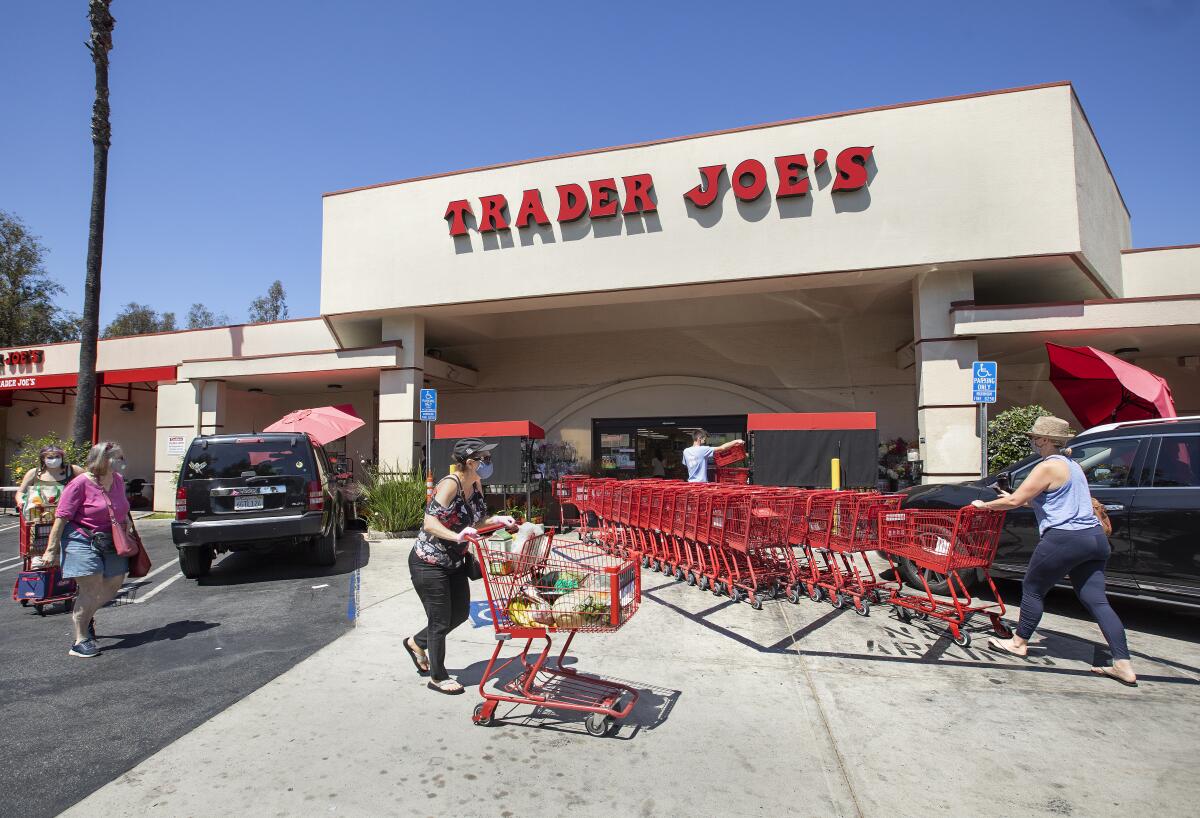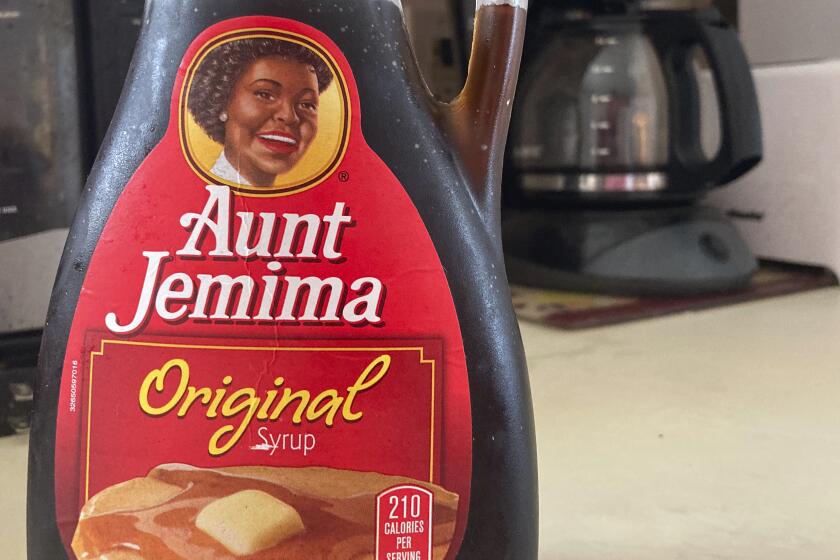A 17-year-old called out Trader Joe’s. Now the chain is dropping offensive labeling

- Share via
When Trader Joe’s founder Joe Coulombe died earlier this year, he was hailed as a marketing whiz, a retail visionary. He had opened a small, nautical-themed market in South Pasadena in 1967 and watched it grow into an empire of nearly 500 stores nationwide.
But today that empire, known for its trading-post motif and international product lines, has come under attack for its branding of ethnic foods. The names Trader Ming’s, Arabian Joe’s, Trader Jose’s, Trader Giotto’s and Trader Joe San appear on items such as habañero and lime salsa, gyoza dipping sauce and artichoke antipasto.
The popular Southern California institution has created “a narrative of exoticism,” according to an online petition posted about two weeks ago calling for Trader Joe’s to remove and rebrand a variety of products with “racist” labeling.
“The Trader Joe’s branding is racist because it exoticizes other cultures — it presents ‘Joe’ as the default ‘normal’ and the other characters falling outside of it,” said the petition posted by 17-year-old Briones Bedell.
In a statement, Trader Joe’s — which Coulombe sold in 1979 to German supermarket chain Aldi — acknowledged that its approach to product naming, “rooted in a lighthearted attempt at inclusiveness ... may now have the opposite effect.” A spokeswoman said the company is changing the packaging and expects to complete the process “very soon.”
What once was considered successful marketing has been shaken by a cultural moment that took hold in the aftermath of George Floyd’s death and the Black Lives Matter demonstrations.
Trader Joe’s says it’s retiring in-house labels such as Trader Jose’s and Trader Ming’s. A petition faulted company for “racist branding and packaging.”
Trader Joe’s had famously thrived on the presumption that all’s fair in the name of free enterprise and commerce, and consumers responded, drawn to its quirky themes and budget pricing.
But over the last few months, public spaces have lost statues, buildings have been stripped of names, and now consumer products are having a day of reckoning amid a nationwide reconsideration of once popularly accepted precepts.
Land O’Lakes has removed the image of a Native American woman from its butter products, and images of Black men and women on product lines such as Aunt Jemima, Uncle Ben’s and Mrs. Butterworth’s are in for a makeover, if they survive at all. The Eskimo Pie name also is being replaced.
“Long gone are the days when the communication between brands and consumers was one way,” said Maria Rodas, a professor of marketing at USC. “Consumers have more power than ever, given the huge amount of information at their fingertips, how connected they all are and the easy access to social media platforms that help broadcast their messages.”
Rodas is not surprised that Trader Joe’s has come under fire.
“Brands are symbols, and some of them are even cultural symbols,” she said. “Years ago, people would buy a product mainly for its functional benefits, but now people expect more of brands and hold them to higher standards.”
Cultural critic M.G. Lord, whose book “Forever Barbie: The Unauthorized Biography of a Real Doll,” examined popular perceptions of that icon, wonders why these brand names were not eliminated sooner. She cites Aunt Jemima and Uncle Ben’s in particular.
“The ‘Aunt’ and ‘Uncle’ clearly reference the way honorifics like ‘Mrs.’ and ‘Mr.’ were withheld from older enslaved people,” Lord said Monday.
In her petition, Briones also calls into question the company’s story about the origin of the market’s nautical theme.
According to the company’s website, at the time Coulombe founded the chain, he “had been reading a book called ‘White Shadows in the South Seas,’ and he’d been to the Disneyland Jungle Trip ride, and it all just … coalesced.”
But “White Shadows,” written by Frederick O’Brien and published in 1919, is far from romantic. The book, according to critics, portrays white capitalists as destroyers of native culture. The story was made into a 1928 silent movie that was considered a technical and artistic landmark at the time.
But Briones and other critics accuse the narrative of “perpetuating the myth of the noble savage and the white god.” Her petition also criticizes the use of stereotypes in Disneyland’s Jungle Cruise.
Inside the Trader Joe’s in Temecula, shoppers crowded the aisles on Monday. Loyal to their store, they were either unconcerned or hadn’t paid attention to the controversy caused by the product labeling.
Britny Montaño, 30, drove across town to the store “for the ethnic foods,” she said, preferring most the Asian curry.
“I honestly never noticed the product names or found anything offensive,” she said. “But it’s difficult because as a person of color, I can see the harm.”
Standing in front of a row of cereal boxes, Sarah Adams said it would not stop her from buying her favorite snacks.
“It doesn’t bother me, I guess that might be my privilege showing,” she said. “I don’t think they meant anything derogatory by the names, but if many people are upset, then I think they should change them.”
Another shopper, Doria Christie, showed no compunction pulling out of her shopping cart her Trader Giotto’s Bambino Pizza Formaggio.
“I’m Italian, and I don’t take offense to it,” she said. “They could put weird photos on these products, and I’d still buy them. Trader Joe’s can’t do anything wrong.”
Such loyalty is to be expected, said Rodas, who puts Trader Joe’s in a different category than the other branding controversies.
“Trader Jose’s and those other names are just one aspect of the whimsical shopping experience at Trader Joe’s, which makes it easy to overlook,” she said.
The indisputably racist brand, and its bewildering longevity, speaks to the power of marketing in reinforcing offensive stereotypes.
In a recent pricing disclaimer, the company cited “fluctuating market prices, federal regulations, currency rates, drought, bandits, rush hour traffic, filibusters, the zombie apocalypse, punctilious product developers.”
Meanwhile, Briones and her family have stopped patronizing Trader Joe’s for the time being.
Briones said in a phone interview with The Times that she is encouraged by the company’s response but wants a commitment to a timetable for removing the products and their ethnic-themes labels.
She knows that her complaint against Trader Joe’s pales next to police brutality, but that the current climate of activism is a ripe moment to question the “microaggressions” that build up to greater harm.
More to Read
Sign up for Essential California
The most important California stories and recommendations in your inbox every morning.
You may occasionally receive promotional content from the Los Angeles Times.














